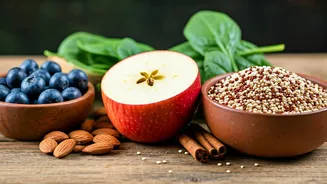Oats: Slow Release
Oats are a slow-digesting grain that provides a steady release of glucose into the bloodstream, preventing sudden spikes in blood sugar. The soluble fiber
in oats forms a gel in the digestive tract, which slows down the absorption of sugar. This gradual release helps maintain stable blood sugar levels. Oatmeal for breakfast can contribute to sustained energy throughout the morning. Choose steel-cut or rolled oats over instant oats for a higher fiber content and better blood sugar control. Oats are also a versatile food, easily combined with fruits, nuts, or seeds for a balanced meal.
Fenugreek: Seed Power
Fenugreek seeds, frequently used in Indian cuisine, possess potent blood-sugar-lowering properties. They contain soluble fiber, which delays the absorption of sugars, similar to oats. Additionally, fenugreek contains compounds that may improve insulin sensitivity, enabling the body to use insulin more effectively. Soaking fenugreek seeds overnight and drinking the water is a common practice, or incorporating the seeds into curries and stews is an excellent way to reap their benefits. Consistency in incorporating fenugreek into your daily diet can show improvements in blood sugar control over time. However, individuals on blood-thinning medication should exercise caution when consuming fenugreek.
Cinnamon: Sweet Spice
Cinnamon, a warming spice beloved in Indian kitchens, has been shown to improve insulin sensitivity and glucose metabolism. Studies suggest that cinnamon can mimic the effects of insulin, helping glucose enter cells more efficiently. Simply adding cinnamon to your morning coffee, sprinkling it on yogurt, or incorporating it into baked goods is a delicious and effective way to support healthy blood sugar levels. It is best to consume a moderate amount of cinnamon. Using it daily or even several times a week can contribute positively to your health.
Bitter Gourd: Acquired Taste
Bitter gourd, or karela, is known for its bitter taste, but it is a powerhouse for blood sugar management. It contains compounds that may have insulin-like effects and helps to lower blood glucose levels. Its ability to reduce blood sugar can make it an important addition to your diet. Bitter gourd can be consumed in various forms, including juice, stir-fries, or cooked vegetables. While the taste may take some getting used to, the health benefits are well worth the effort. Combining bitter gourd with other vegetables and spices can make it a more palatable and enjoyable part of your diet.
Lentils: Steady Comfort
Lentils are a nutritional powerhouse, and also great for blood sugar control. They are high in fiber and protein, which slows down the absorption of glucose. This helps prevent blood sugar spikes after meals. Lentils also have a low glycemic index, making them an excellent food choice for those with diabetes or looking to manage their blood sugar levels. Lentils can be easily integrated into many Indian dishes, such as soups, stews, and dals. Their versatility and nutritional benefits make them a valuable addition to any balanced diet, supporting long-term health and well-being.
Amla: Sour Clarity
Amla, also known as Indian gooseberry, is a rich source of vitamin C and antioxidants, which can improve overall health. It can also aid in blood sugar regulation. Some studies suggest that amla can help to improve insulin sensitivity and reduce post-meal blood sugar spikes. Amla can be eaten raw, juiced, or taken as a supplement. Integrating amla into your daily routine, either through food or supplements, may contribute positively to your blood sugar control. However, it is advisable to consult a healthcare professional before making significant dietary changes.
















